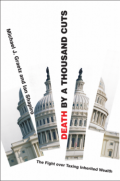Death by a Thousand Cuts: The Fight Over Taxing Inherited Wealth

Michael J. Graetz and Ian Shapiro
March 2005 | $29.95 | ISBN: 0-691-12293-8 | 392 pages
This fast-paced book by Yale professors Michael Graetz and Ian Shapiro unravels the following mystery: How is it that the estate tax, which has been on the books continuously since 1916 and is paid by only the wealthiest two percent of Americans, was repealed in 2001 with broad bipartisan support? The mystery is all the more striking because the repeal was not done in the dead of night, like a congressional pay raise. It came at the end of a multiyear populist campaign launched by a few individuals, and was heralded by its supporters as a signal achievement for Americans who are committed to the work ethic and the American Dream.
Graetz and Shapiro conducted wide-ranging interviews with the relevant players: members of Congress, senators, staffers from the key committees and the Bush White House, civil servants, think tank and interest group representatives, and many others. The result is a unique portrait of American politics as viewed through the lens of the death tax repeal saga. Graetz and Shapiro brilliantly illuminate the repeal campaign’s many fascinating and unexpected turns—particularly the odd end result whereby the repeal is slated to self-destruct a decade after its passage. They show that the stakes in this fight are exceedingly high; the very survival of the long standing American consensus on progressive taxation is being threatened.
Graetz and Shapiro’s rich narrative reads more like a political drama than a conventional work of scholarship. Yet every page is suffused by their intimate knowledge of the history of the tax code, the transformation of American conservatism over the past three decades, and the wider political implications of battles over tax policy.
Michael J. Graetz is the Justus S. Hotchkiss Professor of Law at Yale University and one of America’s foremost experts on tax policy. Ian Shapiro is Sterling Professor of Political Science at Yale University and a leading political theorist.
“Here we are, in the midst of great affluence and a badly skewed distribution of income. Yet, somehow, efforts are well advanced to abolish the estate tax as a first step toward ending the century-old consensus on the idea of progressivity in taxation. Michael Graetz and Ian Shapiro tell in vivid detail the sad (at least to me) story of how that is happening.”
—Paul Volcker, former chairman of the Federal Reserve
“An immensely readable and illuminating look at the estate tax issue and its implications for future American tax policy.”
—Bill Bradley, former United States Senator
“[A] compelling book—a story that should be read by everyone who wants to understand the new power players of the right and their next target: the income tax system itself. When two of America’s best academics combine theory with shoe leather reporting, the results are splendid.”
—David Gergen, Kennedy School of Government, Harvard University; former White House adviser to presidents Nixon, Ford, Reagan, and Clinton.
“It’s not about taxes, stupid. It’s about politics! The book for Democrats who really want to know What’s the Matter With Kansas?”
—Sylvia Nasar, author of A Beautiful Mind
“Death By a Thousand Cuts is a marvelous book. I think of it as sort of a Moneyball for politics, with the role of Billy Bean played by Grover Norquist. The story of how Norquist and company pulled one over on the Democrats (and perhaps centrists of all stripes) is a great read. The book is certain to become a bible for inside-the-beltway readers, but it should be read by a very wide audience. The book changed the way I think about the politics of the estate tax debate. In fact, the book has changed my views about the politics of a number of related issues.”
—Joe Bankman, Stanford University School of Law
“How was the estate tax law overhauled? Why was the tax eliminated for those who die in 2010? Graetz and Shapiro tell the story with wit, verve, and insight. The authors avoid accounts that overvalue the role of rhetorical cleverness or individual greed. They show instead how repeal proponents, out to make their case, skillfully employed powerful narratives about moral principle. This brilliant book brings human drama to the arid domain of tax policy. It is essential reading for those who would influence future debates about progressive taxation and the American ideal of fair opportunity for all.”
—Jeffrey Lehman, President, Cornell University
“This is a terrific book—lively, well written, and razor sharp. Shapiro and Graetz take us on a splendid tour of American politics: out to visit policy entrepreneurs far from the beltway, over to the Washington players at the Heritage Foundation, and deep into the system in the workings of the congressional conference committees. This book is an intelligent person’s Showdown at Gucci Gulch — far broader in its canvas’s, deeper in its analysis, but just as gripping in its eye for telling political detail.”
—James Morone, author of Hellfire Nation